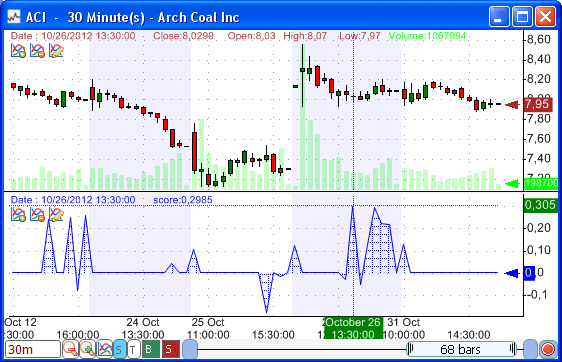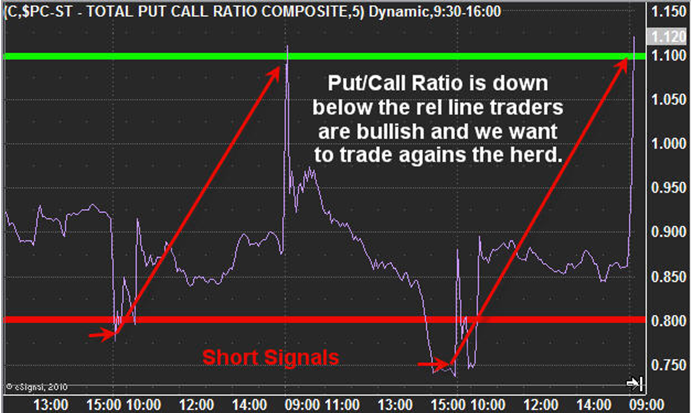Trading Volatility and Market Sentiment
Post on: 24 Сентябрь, 2015 No Comment

In Sunday’s elections, Greece’s pro-bailout political parties defeated the anti-bailout parties to win a parliamentary majority. However, in Monday’s trading session, the markets remained relatively calm. For the day, the S&P 500 and the DJIA traded close to flat and the Chicago Board Options Exchange Market Volatility Index (VIX) fell more than 10%.
The VIX is a weighted measure of the implied volatility in options for the S&P 500 Index. The ultimate goal of the VIX is to measure this implied volatility for the next 30 days. This goal is important because it means the VIX represents a forward looking projection. The VIX is usually referred to as the fear gauge or fear index. When investor volatility expectations and fear increase, the VIX increases.
Trading the VIX and VIX related products is akin to trying to predict market sentiment.
Based on the extensive downward movement in the VIX during the week preceding Monday, investors might conclude that some fear has left the market. Nevertheless, several macro-economic headwinds still exist and have the potential to derail the recovery of several economies. The European debt crisis threatens to spread further into Italy and Spain. Monday, the yield on the Spanish 10-year surged above 7%. Sunday’s elections did not immediately solve the structural problems threatening Europe.
Further ratings cuts may only add to investors’ fears of contagion and a global economic slowdown. Thursday, Egan-Jones cut France’s sovereign credit rating to BBB+ from A- and assigned a negative outlook. On Friday, Fitch Ratings downgraded Egypt’s sovereign credit rating which was already in junk status. Further downgrades could spoil investor sentiment and lead investors to buy insurance on their holdings. This would cause the VIX to spike.
Furthermore, central banks have great influence over market sentiment. The Federal Open Market Committee (FOMC) meets June 19 and 20, potentially adding significance to these trading days.
Following these FOMC meetings, the Federal Reserve might take additional action. Possible actions include extending operating twist, launching QE3, and changing interest rate forecasts.
Many market observers believe the Fed will extend operation twist. Operation twist swaps the Fed’s short-term bond holdings with bonds of longer duration. The Fed might experience diminishing returns if it extends this policy, reducing its impact.
Investors might have trouble discerning whether the Fed will initiate Quantitative Easing 3 (QE3) and how it would affect the markets. Given the uncertainty surrounding the Fed’s actions, QE3 is not likely incorporated into investor expectations. Thus, investors who believe the Fed will initiate QE3 might consider purchasing gold, as it could spike higher after a Fed QE3 announcement.
The Fed’s effects on the equity market depend on investor sentiment. Investors may see the Fed’s action as stimulating the economy, fueling risk-on trading and providing a boost to equities. On the other hand, investors may see the Fed’s initiation of QE3 as an indication that the U.S economy and labor market are weaker than was previously thought, causing a sell-off in equities. Given that equities have rallied as of late and expectations of QE3 have increased, QE3 would likely further the short-term rally.

Central banks have indicated that they would step in if markets become too volatile. Traders who decide to be long the VIX for speculation purposes might consider removing their positions if volatility spikes higher.
Some traders might want to use volatility as a hedge to their existing equity portfolio. To add insurance, these traders might consider entering a long volatility position by purchasing options or futures while the spot VIX is below 19. The VIX is generally uncorrelated to broader market indices. So, volatility is an asset class that can provide genuine diversification.
There are several events which could cause volatility to spike again. Further problems with Greece forming a coalition government and fears of the debt crisis severely affecting Italy and Spain could cause investors to panic. Furthermore, further credit downgrades, fears of a global slowdown, and a perception that central banks will fail to act can also cause volatility to spike.
Investors who do not believe that fear will increase in equity markets might avoid purchasing options or futures until a more compelling opportunity presents itself. These individuals might find concerns about further sovereign credit downgrades and global economic slowdown to be exaggerated.
2015 Benzinga.com. Benzinga does not provide investment advice. All rights reserved.














